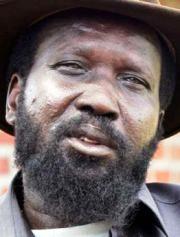New SPLM leader can unify south – experts
By William Maclean
NAIROBI, Aug 2 (Reuters) – The new leader of former southern Sudese rebels is a natural consensus-builder more skilled at solving political disputes in the oil-exporting south than his often autocratic predecessor John Garang, experts say.
 Political cohesion is a critical issue in rebuilding the politically-fractious south following a north-south war in Africa’s largest country, where southern rebels have long demanded the right of self-determination for the south.
Political cohesion is a critical issue in rebuilding the politically-fractious south following a north-south war in Africa’s largest country, where southern rebels have long demanded the right of self-determination for the south.
The speed with which the Sudan People’s Liberation Movement (SPLM) named Salva Kiir as Garang’s successor confirms his status as a unifying figure in a group composed of tribes prone to commercial rivalries and harassed by pro-Khartoum militias.
“He’s a pragmatic military man, a commander on the ground, who has the personality to bring people together,” said Kenyan diplomat Bethuel Kiplagat.
“He’s a stabilising influence,” said veteran Sudan watcher and aid worker Dan Eiffe. “It’s going to be a different style of leadership. It will be more of a group.”
Kiir, a military man in his 50s, was appointed on Monday after former rebel leader Garang died when a Ugandan helicopter he was travelling in went down in bad weather.
Analysts say Kiir may bring a more collegial style to the SPLM leadership which Garang had long dominated with a widely-resented, centralised style of decision-making much in evidence during his negotiation of a January peace accord.
“The SPLM is likely to be more unified under Salva and the speed with which he was appointed reflects that,” said Horn of Africa expert Alex de Waal.
“Garang was a controversial and not particularly liked figure. Salva is a much more unifying figure.”
“He is the right man for the job. (President Omar Hassan al-) Bashir would be a fool to do anything other than welcome him.”
The SPLM fought a civil war for more autonomy for the largely animist and Christian south for 21 years. Two million people were killed and four million uprooted in the conflict.
NATIONAL POWER
The accords give the SPLM a slice of national power, with Garang becoming Sudan’s First Vice President in a new power-sharing government, a job Kiir is now expected to take up.
In November 2004 an open rift emerged between the two men amid allegations in the higher ranks of the SPLM that Garang was failing to consult his colleagues on key decisions he made in peace talks held in Kenya with officials from Khartoum.
Kiir reportedly surrounded himself with loyal troops and refused to leave his compound in Yei town to meet Garang. The situation was partly defused by visits to Yei by emissaries from Garang, the International Crisis Group think tank reported.
Garang himself denied there was ever problem with Kiir, and Kiir has declined to comment on the reports of a rift.
Kiir, like Garang a Dinka, the largest single ethnic group in the south, supported Garang during a period of internal splits and rebellions in the early 1990s.
Along with many in the SPLM, Kiir privately takes a tougher line than Garang took on southern self-determination, experts say, although publicly he has supported Garang’s opinion that it would be preferable for Sudan to remain one country.
Under the peace accords, southerners have the right to vote for secession at the end of a six-year interim period, a concession granted by the Islamist government in response to the rebels’ core demand for the right of self-determination.
Experts say anecdotal evidence shows that southerners would vote en masse for secession if the vote were taken today.
“Garang was the best hope for the unity option, so with his death a unity vote is now perhaps less likely,” said de Waal.
